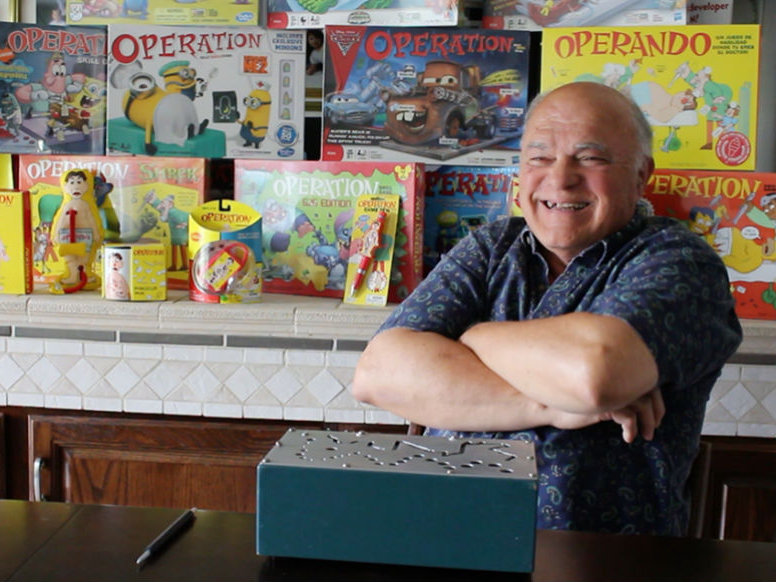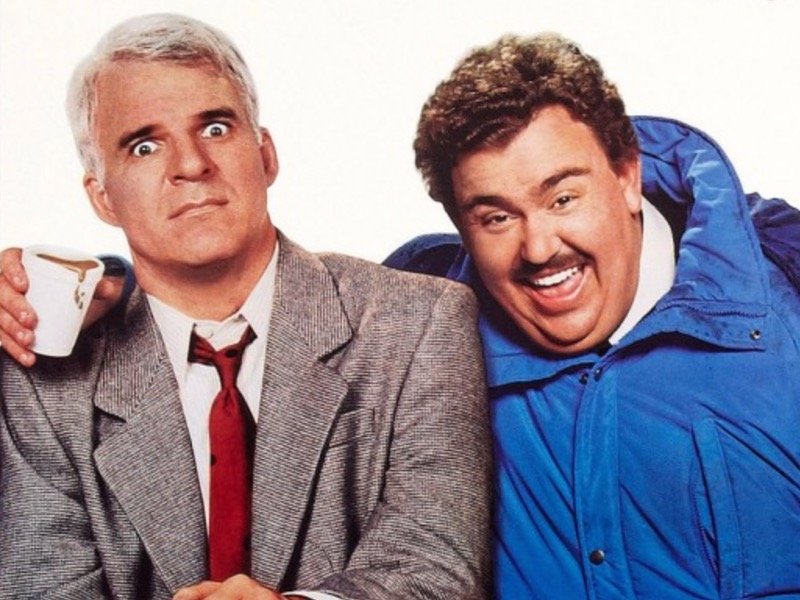Growing up, the Bay View-based toy maker Peggy Brown has plenty of memories of the classic board game Operation – and her family didn’t even own it.
"We didn’t have it in our house, but I remember my neighbor had it, and my Uncle Larry’s family had it," Brown recalled. "When we would go there for Christmas, we would crack it out. I can even go right to the spot on the floor in my Aunt Judy’s house where we used to play it."
Decades later, Brown – along with her friend and fellow toy maker Tim Walsh – are trying to give something back to the man whose legendarily buzz-worthy game gave them so many fun times and fond memories over the years. Their quest began last fall when the two created a Crowdrise in support of John Spinello, the game’s inventor, and it continues on now with "Buzz Heard ‘Round the World," a documentary about the man and the story that pulled on the nation’s heartstrings – very carefully, without touching the sides – last year.
The story technically begins all the way back in 1964, when Spinello was just a student at the University of Illinois. Given an assignment to make a game, he thought back to an old childhood memory for inspiration.
"When he was a child, he stuck a pin in a light socket and got a shock – and he loved it," Brown said. "He thought, well, if I can make a game that felt like that, I think it’d be awesome."
The resulting prototype ended up being what we now know as Operation.
Spinello brought the game to a toy invention firm in Chicago, who offered him a job after school and $500 for his entertaining box of shocks. Needing money and some security – he was recently engaged at the time – Spinello took the deal and signed over the patent. The "goofy game for dopey doctors" went on to become an iconic toy, selling millions of copies across the globe. All the while, its inventor never saw more than the $500 from the original deal – and, according to Brown, he didn’t even get the job.
"A lot of times, designers and inventors are fairly anonymous," Brown said. "If you sell a million books, you’re on top of the New York Times Bestseller list, or if you sell a million records, you’ve got a gold record and you’re all over the cover of Rolling Stone and everything. But if you sell 45 million games, nobody knows who you are."
Decades after the game’s invention, Brown and Walsh became friends with Spinello – according to Brown, the world of toy makers is "a remarkably small circle globally" – who opened up to two about his financial difficulties, including a real-life medical operation he didn’t have sufficient insurance coverage for.
"After we left his house, we thought, ‘Gee, he never really made any money from Operation, but so many people have played the game,’" Brown recalled. "‘If everybody who ever even just chuckled at the game would send him a dollar, he would be set for life.’ So we thought we’d give it a shot and put together a Crowdrise campaign and see if we can raise some money to help him out during his financial predicament."
The campaign ended up going viral, winding up on "Good Morning America," "Jimmy Kimmel Live" and "Today" – just to name a few – and raising $32,422 for John with the original goal of just $25,000. During the whirlwind of support and outreach, Brown and Walsh realized they were a part of something special.
"In addition to money, we had people writing us letters explaining their experiences playing Operation and how much they loved and all the different reasons why it resonated with them," Brown said. "We had lots of letters from doctors and surgeons and nurses that said that having played that game as a child was the reason why they entered the medical profession."
One letter from Dr. Andrew Goldstone from Johns Hopkins Medical School particularly made an impact. In his letter, Dr. Goldstone explained that he had actually invented a device used in millions of thyroid surgeries that, much like Spinello’s game, would buzz if the surgeon got too close the patient’s vocal cords.
"At the time, his little boy asked him to tell him about his invention, and when he told his child, the boy said, ‘Dad, you reinvented Operation!’" Brown said. "The dad said, ‘You’re right! I love that game!’ So he wrote us this wonderful letter telling us this story and saying that the game must’ve been in the back of his head when he created this device that’s used in real surgeries."
That story – combined with the many other letters sent and memories shared with Spinello – convinced Brown and Walsh that there was a larger story to be told here, one not only about a man and his delightfully silly game but also about the games we play, the importance of play and how those seemingly childish activities can help shape who we eventually become. As a result, the duo traded out their toy maker hats for producer ones and recruited the help of Suzanne Jurva, a Bay View-based filmmaker who worked on movies for Dreamworks (as well as directed the upcoming Milwaukee Film Festival selection "Yoopera!"), to bring a documentary to the big screen.
Brown says "Buzz Heard ‘Round the World" already has about 50 hours of footage in the can starting from last fall, but there’s still more they hope to do for the film. Brown and Walsh hope to tell some of the stories and flashbacks through animation, provided by Milwaukee-based former "Simpsons" animator Tim Decker. Plus, they still have more stories and interviews they want to hopefully add to the final product.
To help make those things happen – not to mention the typical post-production expenses (most of which to be done in Milwaukee) of making a feature-length professional-quality film – they’ve turned to crowdfunding once more, setting up an IndieGoGo campaign in the hopes of raising some additional funds to finish the documentary to the best of its ability.
With the help of the IndieGoGo page and fans’ donations, Brown hopes they can give their friend one more long-overdue tribute – and give the world evidence of how significant a silly game of buzzers and bad medical puns can truly be.
"Coming from so many places, it proves our point: Play is powerful, play transforms us and play is at the root of who we are as human beings. The things we play with and the way we play creates our character and it creates your society and the way you interact with people. These are things we know as toy makers, but these are messages that are important for the general public. Play is not a secondary thing that kids should be doing. Play is vitally important."
As much as it is a gigantic cliché to say that one has always had a passion for film, Matt Mueller has always had a passion for film. Whether it was bringing in the latest movie reviews for his first grade show-and-tell or writing film reviews for the St. Norbert College Times as a high school student, Matt is way too obsessed with movies for his own good.
When he's not writing about the latest blockbuster or talking much too glowingly about "Piranha 3D," Matt can probably be found watching literally any sport (minus cricket) or working at - get this - a local movie theater. Or watching a movie. Yeah, he's probably watching a movie.







